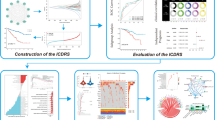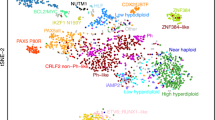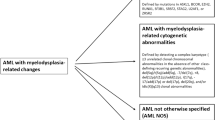Abstract
Acute myeloid leukemia (AML) is the most common type of leukemia in adults with the lowest survival rate of all the leukemias. It is a heterogeneous disease in which a variety of cytogenetic and molecular alterations have been identified. Some galectins were previously reported to have important roles in cancer-like neoplastic transformation, tumor cell survival, angiogenesis, and tumor metastasis. Previous studies have showed that some galectin family members play a role in various types of leukemia. The present study aims at evaluating and clarifying the diagnostic and prognostic value of the expression of cancer-related galectins in relation to the clinicopathological characters of AML patients. Quantitative real-time polymerase chain reaction (qRT-PCR) was used to detect expression profile of eight galectin family members (galectin-1, -2, -3, -4, -8, -9, -12, and -13) in 53 newly diagnosed de novo AML patients. The samples were collected from the inpatient clinic at National Cancer Institute (NCI), Cairo University (CU), diagnosed between July 2012 and May 2013. Our results show that patients with lower LGALS12 gene expression have a lower overall survival than those with higher expression (P value <0.026). Moreover, a statistically significant association between the LGALS4 gene expression and patient age is found. Hence, the higher expression of LGALS4 gene is associated with younger age (adjusted P value <0.001). In conclusion, galectin-12 may be a potential prognostic marker for AML.




Similar content being viewed by others
References
Shipley JL, Butera JN. Acute myelogenous leukemia. Exp Hematol. 2009;37:649–58.
Lowenberg B, Downing JR, Burnett A. Acute myeloid leukemia. N Engl J Med. 1999;341:1051–62.
Vardiman JW, Thiele J, Arber DA, Brunning RD, Borowitz MJ, Porwit A, et al. The 2008 revision of the world health organization (who) classification of myeloid neoplasms and acute leukemia: Rationale and important changes. Blood. 2009;114:937–51.
Memarian A, Nourizadeh M, Masoumi F, Tabrizi M, Emami AH, Alimoghaddam K, et al. Upregulation of cd200 is associated with foxp3+ regulatory t cell expansion and disease progression in acute myeloid leukemia. Tum Biol : J Int Soc Oncodev Biol Med. 2013;34:531–42.
Damm F, Heuser M, Morgan M, Wagner K, Gorlich K, Grosshennig A, et al. Integrative prognostic risk score in acute myeloid leukemia with normal karyotype. Blood. 2011;117:4561–8.
Viguier M, Advedissian T, Delacour D, Poirier F, Deshayes F. Galectins in epithelial functions. Tis Bar. 2014;2:e29103.
Cheng CL, Hou HA, Lee MC, Liu CY, Jhuang JY, Lai YJ, et al. Higher bone marrow lgals3 expression is an independent unfavorable prognostic factor for overall survival in patients with acute myeloid leukemia. Blood. 2013;121:3172–80.
Ustun C, Miller JS, Munn DH, Weisdorf DJ, Blazar BR. Regulatory t cells in acute myelogenous leukemia: Is it time for immunomodulation? Blood. 2011;118:5084–95.
Zhou Q, Munger ME, Veenstra RG, Weigel BJ, Hirashima M, Munn DH, et al. Coexpression of tim-3 and pd-1 identifies a cd8+ t-cell exhaustion phenotype in mice with disseminated acute myelogenous leukemia. Blood. 2011;117:4501–10.
Zhao XY, Zhao KW, Jiang Y, Zhao M, Chen GQ. Synergistic induction of galectin-1 by ccaat/enhancer binding protein alpha and hypoxia-inducible factor 1alpha and its role in differentiation of acute myeloid leukemic cells. J Biol Chem. 2011;286:36808–19.
Wang X, Spandidos A, Wang H, Seed B. Primerbank: a pcr primer database for quantitative gene expression analysis, 2012 update. Nucleic Acids Res. 2012;40:D1144–1149.
Spandidos A, Wang X, Wang H, Seed B. Primerbank: a resource of human and mouse pcr primer pairs for gene expression detection and quantification. Nucleic Acids Res. 2010;38:D792–799.
Spandidos A, Wang X, Wang H, Dragnev S, Thurber T, Seed B. A comprehensive collection of experimentally validated primers for polymerase chain reaction quantitation of murine transcript abundance. BMC Genomics. 2008;9:633.
Wang X, Seed B. A pcr primer bank for quantitative gene expression analysis. Nucleic Acids Res. 2003;31:e154.
Saeed AI, Bhagabati NK, Braisted JC, Liang W, Sharov V, Howe EA, et al. Tm4 microarray software suite. Methods Enzymol. 2006;411:134–93.
Ibrahim AS, Khaled HM, Mikhail NN, Baraka H, Kamel H. Cancer incidence in egypt: results of the national population-based cancer registry program. J Cancer Epidemiol. 2014;2014:437971.
Giordano M, Croci DO, Rabinovich GA. Galectins in hematological malignancies. Curr Opin Hematol. 2013;20:327–35.
Perillo NL, Pace KE, Seilhamer JJ, Baum LG. Apoptosis of t cells mediated by galectin-1. Nature. 1995;378:736–9.
Chung CD, Patel VP, Moran M, Lewis LA, Miceli MC. Galectin-1 induces partial tcr zeta-chain phosphorylation and antagonizes processive tcr signal transduction. J Immunol. 2000;165:3722–9.
Pace KE, Hahn HP, Pang M, Nguyen JT, Baum LG. Cd7 delivers a pro-apoptotic signal during galectin-1-induced t cell death. J Immunol. 2000;165:2331–4.
Pace KE, Lee C, Stewart PL, Baum LG. Restricted receptor segregation into membrane microdomains occurs on human t cells during apoptosis induced by galectin-1. J Immunol. 1999;163:3801–11.
Rabinovich GA, Alonso CR, Sotomayor CE, Durand S, Bocco JL, Riera CM. Molecular mechanisms implicated in galectin-1-induced apoptosis: activation of the ap-1 transcription factor and downregulation of bcl-2. Cell Death Differ. 2000;7:747–53.
Wells V, Davies D, Mallucci L. Cell cycle arrest and induction of apoptosis by beta galactoside binding protein (beta gbp) in human mammary cancer cells. a potential new approach to cancer control. Eur J Cancer. 1999;35:978–83.
Allione A, Wells V, Forni G, Mallucci L, Novelli F. Beta-galactoside-binding protein (beta gbp) alters the cell cycle, up-regulates expression of the alpha- and beta-chains of the ifn-gamma receptor, and triggers ifn-gamma-mediated apoptosis of activated human t lymphocytes. J Immunol. 1998;161:2114–9.
Croci DO, Morande PE, Dergan-Dylon S, Borge M, Toscano MA, Stupirski JC, et al. Nurse-like cells control the activity of chronic lymphocytic leukemia b cells via galectin-1. Leukemia. 2013;27:1413–6.
Junking M, Wongkham C, Sripa B, Sawanyawisuth K, Araki N, Wongkham S. Decreased expression of galectin-3 is associated with metastatic potential of liver fluke-associated cholangiocarcinoma. Eur J Cancer. 2008;44:619–26.
Tsuboi K, Shimura T, Masuda N, Ide M, Tsutsumi S, Yamaguchi S, et al. Galectin-3 expression in colorectal cancer: relation to invasion and metastasis. Anticancer Res. 2007;27:2289–96.
Lee JW, Song SY, Choi JJ, Choi CH, Kim TJ, Kim J, et al. Decreased galectin-3 expression during the progression of cervical neoplasia. J Cancer Res Clin Oncol. 2006;132:241–7.
Turkoz HK, Oksuz H, Yurdakul Z, Ozcan D. Galectin-3 expression in tumor progression and metastasis of papillary thyroid carcinoma. Endocr Pathol. 2008;19:92–6.
Krzeslak A, Lipinska A. Galectin-3 as a multifunctional protein. Cell Molec Biol Lett. 2004;9:305–28.
Kawachi K, Matsushita Y, Yonezawa S, Nakano S, Shirao K, Natsugoe S, et al. Galectin-3 expression in various thyroid neoplasms and its possible role in metastasis formation. Hum Pathol. 2000;31:428–33.
Nakamura M, Inufusa H, Adachi T, Aga M, Kurimoto M, Nakatani Y, et al. Involvement of galectin-3 expression in colorectal cancer progression and metastasis. Int J Oncol. 1999;15:143–8.
Lotan R, Ito H, Yasui W, Yokozaki H, Lotan D, Tahara E. Expression of a 31-kda lactoside-binding lectin in normal human gastric mucosa and in primary and metastatic gastric carcinomas. Int J Cancer J Int du Cancer. 1994;56:474–80.
Yamamoto-Sugitani M, Kuroda J, Ashihara E, Nagoshi H, Kobayashi T, Matsumoto Y, et al. Galectin-3 (gal-3) induced by leukemia microenvironment promotes drug resistance and bone marrow lodgment in chronic myelogenous leukemia. Proc Natl Acad Sci U S A. 2011;108:17468–73.
Hadari YR, Arbel-Goren R, Levy Y, Amsterdam A, Alon R, Zakut R, et al. Galectin-8 binding to integrins inhibits cell adhesion and induces apoptosis. J Cell Sci. 2000;113(Pt 13):2385–97.
Nagy N, Bronckart Y, Camby I, Legendre H, Lahm H, Kaltner H, et al. Galectin-8 expression decreases in cancer compared with normal and dysplastic human colon tissue and acts significantly on human colon cancer cell migration as a suppressor. Gut. 2002;50:392–401.
Bidon-Wagner N, Le Pennec JP. Human galectin-8 isoforms and cancer. Glycoconj J. 2004;19:557–63.
Su ZZ, Lin J, Shen R, Fisher PE, Goldstein NI, Fisher PB. Surface-epitope masking and expression cloning identifies the human prostate carcinoma tumor antigen gene pcta-1 a member of the galectin gene family. Proc Natl Acad Sci U S A. 1996;93:7252–7.
Rechreche H, Mallo GV, Montalto G, Dagorn JC, Iovanna JL. Cloning and expression of the mrna of human galectin-4, an s-type lectin down-regulated in colorectal cancer. Europ J Biochem / FEBS. 1997;248:225–30.
Kondoh N, Wakatsuki T, Ryo A, Hada A, Aihara T, Horiuchi S, et al. Identification and characterization of genes associated with human hepatocellular carcinogenesis. Cancer Res. 1999;59:4990–6.
Hippo Y, Yashiro M, Ishii M, Taniguchi H, Tsutsumi S, Hirakawa K, et al. Differential gene expression profiles of scirrhous gastric cancer cells with high metastatic potential to peritoneum or lymph nodes. Cancer Res. 2001;61:889–95.
Yang RY, Hsu DK, Yu L, Ni J, Liu FT. Cell cycle regulation by galectin-12, a new member of the galectin superfamily. J Biol Chem. 2001;276:20252–60.
Author information
Authors and Affiliations
Corresponding author
Rights and permissions
About this article
Cite this article
El Leithy, A.A., Helwa, R., Assem, M.M. et al. Expression profiling of cancer-related galectins in acute myeloid leukemia. Tumor Biol. 36, 7929–7939 (2015). https://doi.org/10.1007/s13277-015-3513-0
Received:
Accepted:
Published:
Issue Date:
DOI: https://doi.org/10.1007/s13277-015-3513-0




